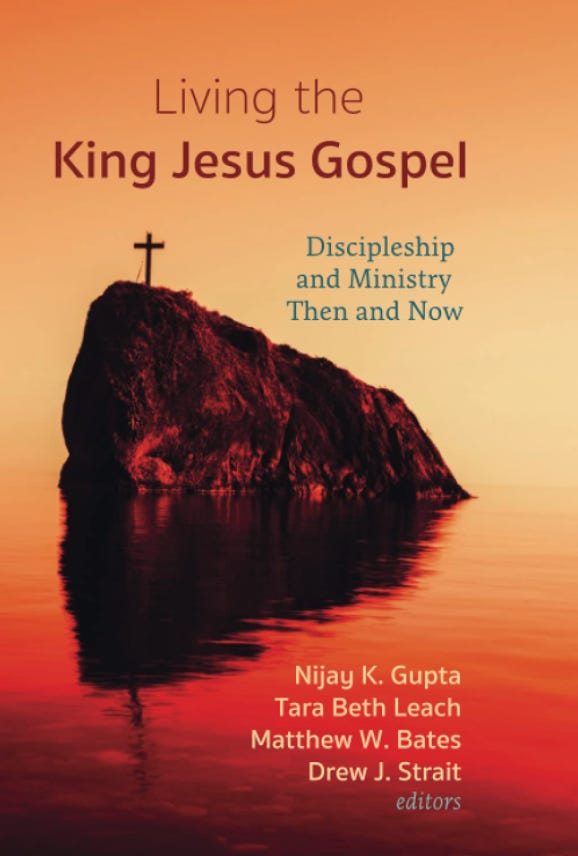Living the Gospel in Acts
I love this line by Matthew Bates, found in his essay “Living the Gospel according to Acts,” in Nijay Gupta, Tara Beth Leach, Matt Bates, and Drew Strait co-editors of Living the King Jesus Gospel: Discipleship and Ministry Then and Now.
If we can’t squeak out a few words affirming Jesus when gathered as a church, how can we hope to testify with conviction in our workplaces or neighborhoods? (35).
He was telling the story of his first time listening to a black preacher who was not getting the typical Call & Response responses from this mostly white Presbyterian audience. Amen!
Many of you will know I was a big fan of Matt’s Salvation by Allegiance Alone book, which confirmed what I saw in his published dissertation, and I also love his book Gospel Allegiance. We are on such parallel tracks about the gospel that we might just be on the same rail! Both of are witnesses to a resurgent interest in a more Jesus-shaped gospel as we challenge the American gospel, which I call the soterian gospel.
Scot McKnight is the author of a recent book called “5 Things a Biblical Scholar Wants a Theologian to Know.”
Centrality of Bearing Witness
Acts opens with a little discussion of the kingdom, which the disciples understand as the restoration of the Davidic kingdom in Jerusalem. To this Jesus responds. The kingdom will be restored, Jesus says in 1:8, through your becoming witnesses. Kingdom assumptions are hereby seriously challenged. The kingdom comes through their Spirit-inspired witness. The words connected to Jesus’ ascension indicate the kingdom will not be complete until Jesus’ return. They respond with a twelve-person restoration, and Pentecost is the Jerusalem-based origin of the mission to the world that is at least partly engaged by the returning home of those filled with the Spirit at Pentecost! Matt points us to Acts 2:22-24:
Fellow Israelites, listen to this: Jesus of Nazareth was a man accredited by God to you by miracles, wonders and signs, which God did among you through him, as you yourselves know. This man was handed over to you by God’s deliberate plan and foreknowledge; and you, with the help of wicked men, put him to death by nailing him to the cross. But God raised him from the dead, freeing him from the agony of death, because it was impossible for death to keep its hold on him.
Note this: As God witnessed to the Son, so the disciples are to join God in witnesses to king Jesus. To witness is to participate in God’s work in this world. To witness is Trinitarian:
Jesus of Nazareth is a man attested by God the Father as the Christ in the events of the gospel. God’s people inhabit the divine life by a Spirit-empowered re-attesting of Jesus the Messiah (39). [Love it.]
The Summarized Gospel Attested
Matt states that the gospel is about how to get saved but can be reduced in Acts to “The Messiah is Jesus.” He’s right. It requires culture transformation for this to sink in and work its way through the whole system, and Matt is doing his best to nurture that transformation. I’m with him.
Look up these verses: Acts 5:42; 8:4-5, 12; 9:22; 17:2-3; 18:5, 28.
With “king” Jesus as the gospel, there is no tension of gospel and kingdom.
The Expanded Gospel Attested
In Acts those fuller sermons, say Acts 2 or Acts 13 (Paul in Pisidian Antioch), are about how the Messiah-is-Jesus became Messiah through his life, his unjust crucifixion, his burial, his resurrection, his embodied and verbal witness, and his ascension to the throne. This is where Matt is a specialist, and he starts with CH Dodd’s wonderful little book but expands that as he summarizes his great work in his dissertation: The Hermeneutics of the Apostolic Proclamation. But he also re-articulated all this in his Gospel Allegiance book. If Jesus is king, tyrants are not; if Jesus is king, I am not; if Jesus is king, benefits come their way by allegiance to that king. Matt and I are keen on distinguishing gospel from benefits without minimizing benefits one bit. It’s about order. It’s about exegesis.
Finally, how do we sustain that witness:
1. By gathering
2. By prayer
3. By inscribing the gospel bodily: that is, to enter into the gospel life by all that we say and do. We witness in an embodied witness by how we live.
I love this chapter, of course, but Bates puts in this chapter much of his scholarship thus far, and it is a real gift for all who will read it.




